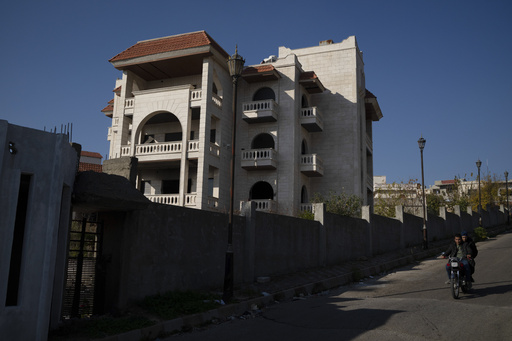
QARDAHA, Syria — Recently, expressions of disdain have marred the once-pristine mausoleum dedicated to Hafez Assad, the late former president of Syria. Vandals have inscribed various phrases including, “Damn your soul, Hafez,” on its walls. This act of defacement coincides with the aftermath of the overthrow of his son, Bashar Assad, following a swift military offensive that dismantled over fifty years of Assad family rule. The lavish mausoleum, where Hafez’s remains were housed, witnessed significant destruction at the hands of rebel fighters, rendering the site heavily damaged.
In the wake of this historic shift, many locals flocked to Qardaha, the hometown of the Assad dynasty nestled in the mountains above Latakia. They gathered around the remains of the mausoleum and the estates once owned by the family, which were previously inaccessible to the residents. The family’s opulent lifestyle starkly contrasted with that of most locals, many of whom are members of the Alawite sect. While the Assads enjoyed a life of luxury, most residents labored in menial jobs or agriculture, struggling to make a living. The military service was often less about allegiance to the regime and more a matter of survival for many families.
Deeb Dayoub, a sheikh from the Alawite community, reflected on the misconceptions about Qardaha’s affluence. “The reality was much different from the grand image others had,” he remarked, alluding to the marble-floored homes of the Assads. Ali Youssef, a local shopkeeper, lamented the state of the area, noting that potholes marred the streets of what should be the town’s main marketplace. He recounted how residents have resorted to meals of bread dipped in oil and salt, unable to afford basic proteins or vegetables. Economic hardship was pervasive, with many young men avoiding military conscription until it became unavoidable.
With salaries averaging just over $20 a month, locals like Youssef had to strive to support their families, feeling the weight of a regime that largely benefited only a select few. A sense of respect has emerged from the current security forces, comprising members of Hayat Tahrir al-Sham, the group that has taken control post-Assad. Some residents voiced cautious optimism regarding their treatment under the new rule.
Mariam al-Ali expressed relief about the security situation while conveying lingering concerns over issues of equity and civil rights. Although she labeled Assad a “traitor,” she highlighted the critical need for unity and an avoidance of sectarian strife. Sheikh Dayoub noted a prevailing atmosphere of caution among the community but mentioned that unease has started to lessen following the regime’s collapse.
Amid these conditions, discussions at the local municipal building have centered on economic distress. Retired public officials are awaiting unpaid pensions, fuel costs have surged, and the absence of public transport worsens the challenges. In the midst of these discussions, community members voiced their desire for equitable rights, showcasing a determination to redefine their place in the revitalization of the nation.
Concerns linger about the fate of young men from the region who served in Assad’s military. The chaos of the army’s dissolution left many recruits from Qardaha unaccounted for, with reports indicating that some have ended up in detention facilities. Families like that of Qais Ibrahim have faced anxieties over missing loved ones, uncertain of their fate amid the conflict’s rapid transition.
Um Jaafar, using a pseudonym for anonymity, shared her family’s plight as they awaited news on her sons, stationed in volatile regions. These young men, she described, joined the army merely to secure a meager income due to a lack of options. As Syria’s new authorities establish “reconciliation centers” for former soldiers, community leaders seek a framework that emphasizes accountability rather than selective justice.
Jaafar Ahmed, a doctoral candidate and community activist, articulated the necessity of either universal forgiveness or a comprehensive accountability process for all involved in the conflict. He acknowledged the complex dynamics of past militias while expressing hope for a future marked by either reconciliation or transitional justice. “There must be accountability across the board,” he insisted, maintaining that it cannot be one group facing consequences while others remain exempt.
